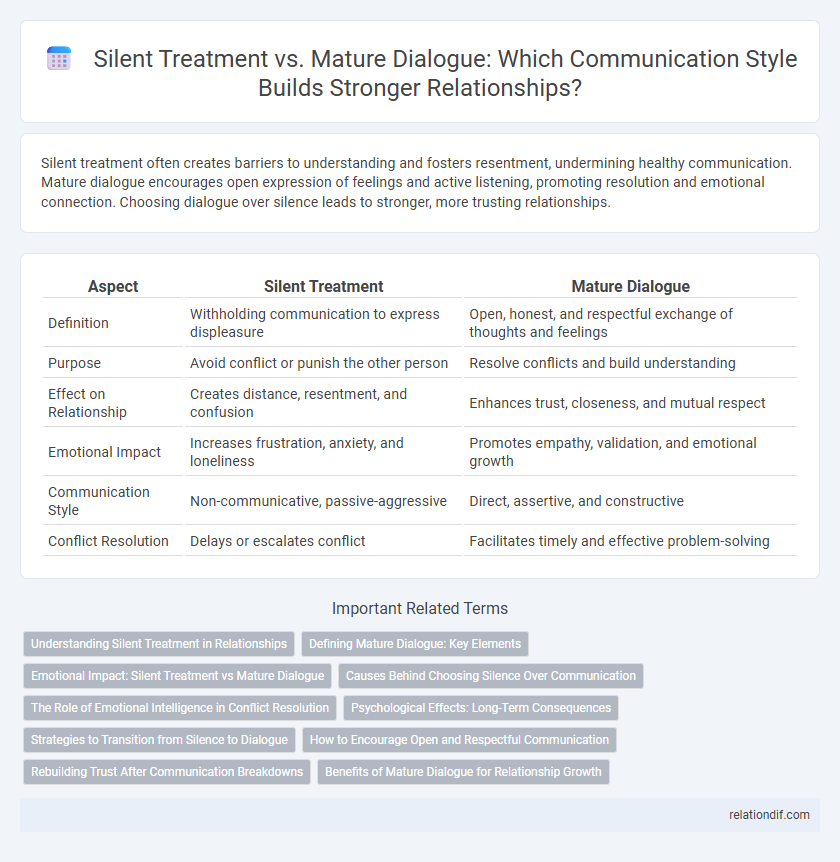Silent treatment often creates barriers to understanding and fosters resentment, undermining healthy communication. Mature dialogue encourages open expression of feelings and active listening, promoting resolution and emotional connection. Choosing dialogue over silence leads to stronger, more trusting relationships.
Table of Comparison
| Aspect | Silent Treatment | Mature Dialogue |
|---|---|---|
| Definition | Withholding communication to express displeasure | Open, honest, and respectful exchange of thoughts and feelings |
| Purpose | Avoid conflict or punish the other person | Resolve conflicts and build understanding |
| Effect on Relationship | Creates distance, resentment, and confusion | Enhances trust, closeness, and mutual respect |
| Emotional Impact | Increases frustration, anxiety, and loneliness | Promotes empathy, validation, and emotional growth |
| Communication Style | Non-communicative, passive-aggressive | Direct, assertive, and constructive |
| Conflict Resolution | Delays or escalates conflict | Facilitates timely and effective problem-solving |
Understanding Silent Treatment in Relationships
Silent treatment in relationships often signals unresolved conflicts and emotional withdrawal, hindering effective communication and fostering resentment. Mature dialogue promotes open expression of feelings and active listening, facilitating mutual understanding and conflict resolution. Prioritizing healthy communication patterns strengthens emotional bonds and reduces misunderstandings in intimate partnerships.
Defining Mature Dialogue: Key Elements
Mature dialogue involves active listening, empathy, and clear expression of thoughts and feelings, fostering mutual understanding and respect. It emphasizes honest communication without blame or judgment, enabling conflict resolution and emotional connection. This approach contrasts sharply with the silent treatment, which hinders communication and damages relationships by creating emotional distance.
Emotional Impact: Silent Treatment vs Mature Dialogue
Silent treatment often leads to emotional distress, fostering feelings of rejection and unresolved tension that damage relationships over time. In contrast, mature dialogue promotes emotional clarity by encouraging open expression and active listening, which strengthens trust and mutual understanding. Effective communication through mature dialogue reduces anxiety and builds emotional resilience between individuals.
Causes Behind Choosing Silence Over Communication
Choosing silence over communication often stems from fear of conflict, emotional vulnerability, or a lack of effective communication skills. Individuals may resort to the silent treatment as a defense mechanism to avoid confrontation or express dissatisfaction indirectly. Understanding these underlying causes is crucial for fostering mature dialogue and resolving interpersonal issues constructively.
The Role of Emotional Intelligence in Conflict Resolution
Emotional intelligence plays a crucial role in conflict resolution by enabling individuals to recognize and manage their own emotions while empathizing with others, promoting mature dialogue over silent treatment. Employing emotional intelligence facilitates open communication, reduces misunderstandings, and fosters mutual respect, which are essential for resolving disputes effectively. The ability to regulate emotional responses and express feelings constructively transforms conflicts into opportunities for growth and stronger relationships.
Psychological Effects: Long-Term Consequences
Silent treatment can lead to increased anxiety, depression, and emotional isolation due to unresolved conflicts and diminished trust over time. Mature dialogue fosters psychological well-being by promoting emotional expression, empathy, and conflict resolution, reducing stress and strengthening relationships. Consistent use of open communication aids in building resilience and long-term mental health stability.
Strategies to Transition from Silence to Dialogue
Effective strategies to transition from silent treatment to mature dialogue include establishing a safe environment where all parties feel heard and respected, which encourages openness and vulnerability. Utilizing active listening techniques and expressing thoughts with "I" statements fosters understanding and reduces defensiveness. Setting clear intentions to resolve conflicts collaboratively promotes a shift from avoidance to constructive communication.
How to Encourage Open and Respectful Communication
Encouraging open and respectful communication requires fostering an environment where individuals feel safe to express their thoughts without fear of judgment or retaliation. Implementing active listening techniques and validating emotions can break the cycle of silent treatment, promoting maturity in dialogue. Clear boundaries and timely feedback empower participants to address conflicts constructively, enhancing mutual understanding and trust.
Rebuilding Trust After Communication Breakdowns
Silent treatment erodes trust by creating emotional distance and unresolved conflict, making it difficult to rebuild connection in relationships. Engaging in mature dialogue fosters open communication, allowing parties to express feelings, clarify misunderstandings, and collaboratively develop solutions. Consistent, empathetic conversations are essential for restoring trust and strengthening relational bonds after communication breakdowns.
Benefits of Mature Dialogue for Relationship Growth
Mature dialogue fosters trust and emotional intimacy by encouraging open, honest communication and active listening, which resolves conflicts effectively. It promotes mutual understanding and empathy, strengthening the foundation of any relationship. Embracing mature dialogue reduces misunderstandings and resentment, leading to sustained relationship growth and deeper connection.
Silent treatment vs Mature dialogue Infographic

 relationdif.com
relationdif.com